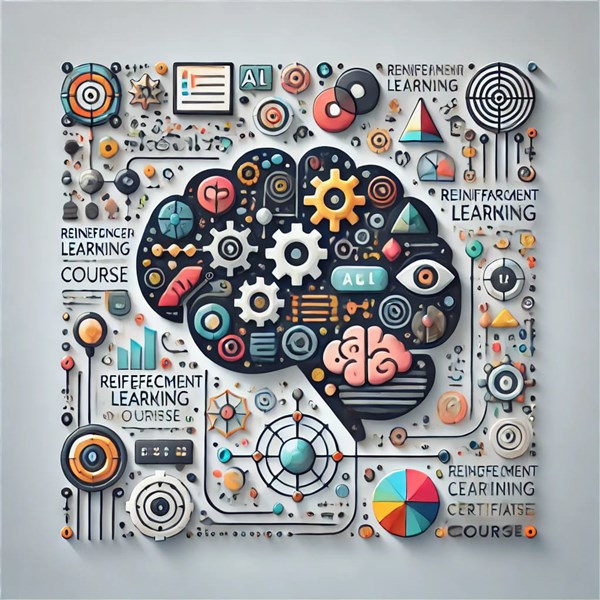Unable to find what you're searching for?
We're here to help you find it
Artificial Intelligence is transforming every industry — from autonomous vehicles to personalized finance and real-time strategy games. At the core of many advanced AI systems lies Reinforcement Learning (RL), a paradigm where agents learn optimal behaviors through trial and error.
But RL isn’t just another buzzword in machine learning. It’s a powerful framework that demands both mathematical intuition and algorithmic mastery. That’s why a Reinforcement Learning Certification Course is a valuable investment — not just to learn, but to apply RL techniques in the real world.
In this blog, we’ll explore what you’ll actually learn in a reinforcement learning certification course and why each concept matters in shaping intelligent systems.
Reinforcement Learning is a branch of machine learning where an agent learns to make decisions by interacting with an environment. Through a system of rewards and penalties, the agent learns which actions yield the best outcomes over time.
Unlike supervised learning — where data is labeled — or unsupervised learning — where patterns are extracted — RL is all about learning from experience.
Whether you’re taking a certification course through Koenig Solutions, university programs, or online platforms, here are the foundational topics and skills you’ll master:
What it is:
The backbone of reinforcement learning, Markov Decision Processes (MDPs) provide a mathematical framework for modeling decision-making environments.
What you'll learn:
Why it matters:
Understanding MDPs is crucial for framing RL problems and creating formal models for real-world applications — from robotic control to inventory management.
What it is:
Q-learning is one of the most popular value-based reinforcement learning algorithms. It allows agents to learn the value of action-state pairs and improve their policy without knowing the environment dynamics.
What you'll learn:
Why it matters:
Q-learning is widely used in games, navigation tasks, and basic robotics. It forms the foundation for understanding Deep Q-Networks (DQN) — a leap toward deep reinforcement learning.
What it is:
Instead of learning the value of actions, policy-based methods learn a direct mapping from states to actions. This is especially useful in continuous action spaces.
What you'll learn:
Why it matters:
Policy gradients are essential for tasks like robotic arm control and continuous simulations where value functions can’t easily represent action space.
What it is:
Actor-Critic algorithms combine value-based and policy-based approaches to create more stable and efficient learning.
What you'll learn:
Why it matters:
This is a cornerstone of advanced RL and used in real-world implementations like OpenAI’s robotic hand or self-play training in AlphaGo.
What it is:
Deep RL combines neural networks with RL algorithms to handle high-dimensional input (like video frames).
What you'll learn:
Why it matters:
DRL enables agents to learn from pixels — making it suitable for complex tasks like gaming, autonomous navigation, and visual decision-making.
What it is:
Efficient exploration is critical in RL, especially when rewards are sparse.
What you'll learn:
Why it matters:
Good exploration prevents agents from converging prematurely to suboptimal policies — vital in real-time systems and games like Dota 2 or StarCraft.
What it is:
Designing the reward signal is a fine art in RL.
What you'll learn:
Why it matters:
The agent’s behavior is only as good as the reward signal. Misaligned incentives can lead to bizarre or unsafe outcomes.
What it is:
Explore environments with multiple learning agents who collaborate or compete.
What you'll learn:
Why it matters:
From automated trading to autonomous traffic control — real-world applications often involve multiple intelligent agents.
What it is:
You’ll work on hands-on projects where you apply everything you’ve learned.
Sample projects:
Why it matters:
Projects showcase your skills to recruiters, reinforce theoretical concepts, and give you the confidence to build real systems.
Koenig Solutions offers a globally recognized Reinforcement Learning Certification program that includes:
Whether you're a data scientist, AI researcher, or software engineer, Koenig’s course gives you the edge to master RL from the ground up.
🔚 Conclusion
Reinforcement Learning is more than an AI buzzword — it’s a powerful toolset shaping the next era of intelligent systems. A Reinforcement Learning Certification Course teaches you the core math, the algorithms, the deep learning integrations, and the real-world applications that make RL so impactful.
By completing a course and earning your certification, you’re not just learning — you’re building the future of AI.
As a leading IT training company, Koenig Solutions is dedicated to providing top-notch certification courses in various technology domains. Our Reinforcement Learning Certification Course is designed to equip you with the right knowledge and skills to excel in your career.
In conclusion, the knowledge and expertise gained from a robust reinforcement learning certification course can transform your career and prepare you for the AI-driven future.
📢 Call to Action
🎓 Explore Reinforcement Learning Certification at Koenig Solutions
📞 Speak with a Course Advisor for a Personalized Learning Plan
📥 Download the Full Curriculum and Project Showcase

Aarav Goel has top education industry knowledge with 4 years of experience. Being a passionate blogger also does blogging on the technology niche.










